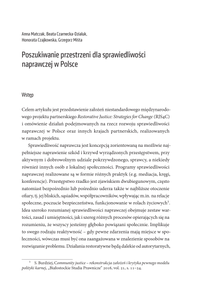This article draws on Robinson, McNeill and Maruna’s argument (2012) about the adaptability of community sanctions and measures, observed through four distinctive penal narratives, in order to shed light on the regional development of community service in Wroclaw, Poland. While the managerial adaptation of community sanctions is underpinned by an inter-agency cooperation to fulfil the goals of the system, the contemporary rehabilitation iteration has become a toolkit of measures predominantly phrased around risk management, the reparative discourse seeks various means to repair harm, and the punitive orientation represent the turn to desert-based and populist sentencing frameworks. In this article, the first three are reflected upon along with the emerging, restorative adaptation of community sanctions. The last one is added to expand on the findings of previous research, which suggests the viability of the restorative orientation for community service in Poland (Matczak, 2018). A brief discussion of how punishment, probation and restorative justice can be reconciled is followed by the introduction of Polish Probation and the role of probation officers in delivering community service in Poland. Although the penal narratives are visible in the Wrocław model to different degrees and in various combinations, more research is required to evaluate the viability of a progressive orientation to punishment during a gradual optimisation of community orders. Originally published: Anna Matczak, The penal narratives of community sentence and the role of probation: The case of the Wrocław model of community service, European journal of probation (Vol. 13 nr. 1) pp. 72-88. Copyright © 2021year (The Author). DOI: 10.1177/2066220320976105
MULTIFILE

A workshop that took place on the conference "The Restoration of Normality – Mirroring the Past in the Future" with the themes (among others) domestic violence, restorative justice, social support for ex-offenders, education & training and building up a probation service.
DOCUMENT

This chapter applies the theory of symbolic interactionism to present the qualitative analysis of 51 sentencing decisions in domestic violence homicide cases processed in Polish courts. It is argued in this chapter that sentencing, like any other human action, is subject to interpretations at the hands of judges, who engage in the construction and meaning-making process of gender at the sentencing stage. The findings demonstrate the diversely-constructed presence of gendered narratives, which vary in terms of their inclusion of the domestic violence terminology and/or the discussion on the fulfilment of socially-prescribed gender roles. The analysis has exposed a powerful interplay between the judges’ perception of the (abusive) relationship, gender roles, and the defendant’s/victim’s acquiescence to them, which in consequence makes women more likely the subject of double standards of conformity. The chapter offers a qualitative outlook on the topic and invites a new theoretical perspective to shift the attention from the impact of gender – to the meaning of gender – in sentencing decisions.
MULTIFILE

The aim of this article is to present the objectives of a customised international partnership project Restorative Justice: Strategies for Change (RJS4C) project, and discuss activities undertaken for the development of restorative justice in Poland and other partner countries.
MULTIFILE

This is the report on the situation in the Netherlands in the field of youth, young homeless people and unaccompanied minor aliens. The report describes risk factors for children and young people in relation to social exclusion and homelessness. This report forms the first part of the international comparative study ‘CSEYHP’. MOVISIE carries out this three-year study by order of the European Union. The cooperative partners are three universities in: England, the Czech Republic and Portugal. The objectives of ‘Combating Youth Homelessness’ are as follows: 1. to understand the life trajectories of different homeless youth populations in different national contexts; 2. to develop the concepts of risk and social exclusion in relation to the experience of young homeless people and to the reinsertion process; 3. to test how different methods of working contribute to the reinsertion process for young people; 4. to investigate the roles of and relationships between the young person, trusted adults, lead professionals, peer mentors and family members in the delivery of these programmes across all four countries. When preparing the national reports, the three partner countries the Czech Republic, England and Portugal use the same format as used in the Dutch report. Based on the four national reports, England will prepare a comparative report, in which the four national situations will be compared.
DOCUMENT
